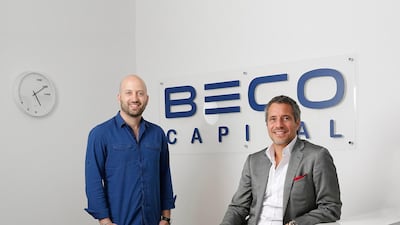Beco Capital, a Dubai-based venture capital firm, raised $100 million (Dh367m) through its second fund, $20m more than its initial target as appetite for investments in start-ups grows.
The higher demand for Beco Fund II was driven by "the significantly improved technology investment landscape" in the region, the company said in a statement on Wednesday.
The second fund received backing from a number of investors in Beco Capital's first fund including the International Finance Corporation, a development finance arm of the World Bank, and Rimco Investment. New investors include Warba Bank, Al Waha Venture Capital Fund of Funds, an investment vehicle owned by Bahrain's sovereign wealth fund Mumtalakat, and family offices such as Watar Partners and KAAF Investments.
“Success stories like Careem have produced dozens of highly-skilled and experienced individuals, who have built businesses to global standards and at immense scale. We believe these individuals will go on to have the equivalent [effect] of PayPal in the region, building the next wave of great companies that will serve regional and global markets,” said Dany Farha, co-founder and managing partner at Beco Capital.
Ride hailing company Careem, which was sold to competitor Uber in a $3.1 billion deal earlier this year, was one of 22 investments Beco Capital made via its first fund and one of four exits from the fund to date. Beco Capital has also backed three companies started by ex-Careem employees.
Other notable investments have included the backing of Dubai-based real estate portal Property Funder, which raised $120m in its last funding round.
The company typically invests in early-stage start-ups that have founders and engineering teams based in the region at both seed and Series A funding stages, but then provides follow-on funds for the best-performing companies in its portfolio.
"We're still going to be focusing on seed and Series A as we were in the first fund, but with follow-ons we have more reserves given the fund size," co-founder and managing partner Amir Farha told The National, saying that it typical reserves around 50 per cent of funding to invest in follow-on funding.
He said that the new fund took about two years to raise.
"We were raising at a time when people were still questioning whether there were viable exit opportunities for these companies, and then during the period of raising we had one massive exit (Careem). It didn't really help us that much because we had at that point raised a significant part of the fund but at that point it just brought about more demand for the asset class."
He said that more companies in the region have been able to raise bigger rounds of capital, both from international investors and from local investors seeking better returns than are available elsewhere.
"People are getting more aware of this asset class. They start seeing these younger entrepreneurs emerging with bigger ideas," Amir Farha said. "Secondly, the market is not great in other sectors. That benefits us because, by default, investors look to find other sources of returns and this happens to be one of the best at this point in the market.
"Real estate is a difficult asset class right now in the region, public market are somewhat turbulent and private equity as an asset class in the region is struggling. By default, they are more open to other asset classes."
In July, technology platform Magnitt, which tracks venture capital investment in the region, said that a record number of start-up investment deals took place in the first half of 2019. The amount of funds raised increased by 66 per cent to $471m and the number of deals increased by 28 per cent to 238.


